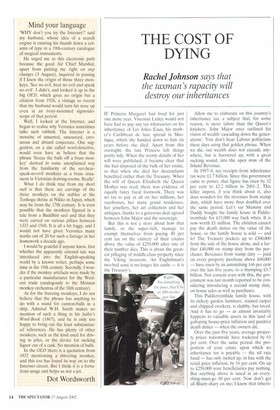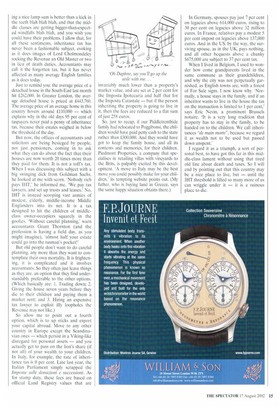THE COST OF DYING
Rachel Johnson says that the taxman's rapacity will destroy our inheritances
IF Princess Margaret had lived for just one more year, Viscount Linley would not have had to pay any tax whatsoever on his inheritance of Les Jolies Eaux, his mother's Caribbean de luxe spread in Mustique, which she handed down to him six years before she died. Apart from this oversight, the late Princess left things pretty tidy. When the scanty details of her will were published, it became clear that she had disposed of the bulk of her estate, so that when she died her descendants benefited rather than the Treasury. When the will of Queen Elizabeth the Queen Mother was read, there was evidence of equally fancy fiscal footwork. There was no tax to pay at all on her millions, her racehorses, her many grand residences, her jewellery, her art collection and her antiques, thanks to a generous deal agreed between John Major and the sovereign.
But this is not a story about how that family, or the super-rich, manage to exempt themselves from paying 40 per cent tax on the entirety of their estates above the value of /250.000 after one of their number dies. This is about the greatest pillaging of middle-class property since the Viking invasions. An Englishman's two-bed semi is no longer his castle — it is the Treasury's. Allow me to elaborate on this country's inheritance tax, a subject that, for some reason, is more taboo than the Queen's knickers. John Major once outlined his vision of wealth 'cascading down the generations'. You don't hear Labour politicians these days using that golden phrase. When we die, our wealth does not cascade anywhere, but is hoovered up, with a great sucking sound, into the open maw of the Inland Revenue.
In 1997-8, net receipts from inheritance tax were £1.7 billion. Since this government came to power, that figure has risen by 32 per cent to £2.2 billion in 2001-2. This killer impost, if you think about it, also does wonders for the revenues from stamp duty, which have more than doubled over the same period. Let's say Mummy and Daddy bought the family house in Piddletrenthide for £15,000 way back when. It is now worth £1 million. The children cannot pay the death duties on the value of the house, so the family house is sold — and lo! The Treasury pockets up to £300,000 from the sale of the house alone, and a further £40,000 on stamp duty from the purchaser. Revenues from stamp duty — paid on every property purchase above £60,000 — have risen by an astonishing 146 per cent over the last five years, to a thumping £3.7 billion. Not content even with this, the government was last month reported to be considering introducing a second stamp duty, on house sales as well as purchases.
This Piddletrenthide family house, with its rickety garden furniture, stained carpet and chipped crockery, is shabby, but loved. And it has to go — as almost invariably happens to valuable assets in this land of galloping house-price inflation and punitive death duties — when the owners die.
Over the past five years, average property prices nationwide have rocketed by 61 per cent. Over the same period, the proportion of your estate upon which no inheritance tax is payable — the nil rate band — has only inched up, in line with the retail price inflation, by 16 per cent. On up to £250,000 your beneficiaries pay nothing. But anything above is taxed at an everything-must-go 40 per cent. Now don't get all Blairy-shary on me; I know that inherit ing a nice lump sum is better than a kick in the teeth blah blah blah, and that the middle classes are getting bigger-than-expected windfalls blah blah, and you wish you could have their problems. I allow that, for all these sentiments, inheritance tax has never been a fashionable subject, evoking as it does images of Lord Cholmondeley socking the Revenue an Old Master or two in lieu of death duties. Accountants may call it the forgotten tax, but it has never affected as many average English families as it does today.
Just to remind you: the average price of a detached house in the South-East last month hit 1262,000. In Greater London, the average detached house is priced at £443,760. The average price of an average home in this country hovers around £110,000 — which explains why in the old days 95 per cent of taxpayers never paid a penny of inheritance tax, because their estates weighed in below the threshold of the day.
But now, the offices of accountants and solicitors are being besieged by people, not just pensioners, coming in to ask what they can do about the fact that their houses are now worth 20 times more than they paid for them. It is not a toff's tax. When I was discussing this subject with a big swinging dick from Goldman Sachs, he looked at me with scorn. 'Nobody rich pays IHT.' he informed me. 'We pay tax lawyers, and set up trusts and leases.' No, IHT is instead scooping vast armies of modest, elderly, middle-income Middle Englanders into its net. It is a tax designed to hit the children of middleclass owner-occupiers squarely in the goolies. 'Without careful planning,' warn accountants Grant Thornton (and the profession is having a field day, as you might imagine), 'almost half your estate could go into the taxman's pocket!'
But old people don't want to do careful planning, any more than they want to contemplate their own mortality. It is frightening, it is complicated and it involves accountants. So they often just leave things as they are, an option that they find understandably preferable to the other options. (Which basically are: 1, Trading down; 2. Giving the house seven years before they die to their children and paying them a market rent; and 3. Hiring an expensive tax lawyer to exploit iffy loopholes the Revenue may not like.)
So allow me to point out a fourth option, which is to up sticks and export your capital abroad. Move to any other country in Europe except the Scandinavian ones — which persist in a Viking-like disregard for personal assets — and you actually get to pass on the lion's share (if not all) of your wealth to your children. In Italy, for example, the rate of inheritance tax is 0 per cent. Late last year, the Italian Parliament simply scrapped the Imposta sidle donazioni e successioni. As for stamp duty, these fees are based on official Land Registry values that are invariably much lower than a property's market value, and are set at 2 per cent for the lmposta Ipotecaria and half that for the Imposta Catastale — but if the person inheriting the property is going to live in it, then the fees are reduced to a flat sum of just 258 euros.
So, just to recap, if our Piddletrenthide family had relocated to Poggibonsi, the children would have paid petty cash to the state rather than £300,000. And they would have got to keep the family house, and all its contents and memories, for their children. Piedmont Properties, a company that specialises in retailing villas with vineyards to the Brits, is palpably excited by this development. 'A move to Italy may be the best move you could possibly make for your children.' its tempting website points out. (My father, who is buying land in Greece, says the same happy situation obtains there.) In Germany, spouses pay just 7 per cent on legacies above 614,000 euros, rising to 30 per cent on legacies above 32 million euros. In France, relatives pay a modest 5 per cent impost on legacies above 137,000 euros. And in the US, by the way, the surviving spouse, as in the UK, pays nothing, and all other bequests above a chunky 5675,000 are subject to 37 per cent tax.
When I lived in Belgium, I used to wonder how come grandparents lived in the same commune as their grandchildren, and why the city was not perpetually garnished, as English towns are, with a forest of For Sale signs. I now know why. 'Normally, a house stays in the family, and if an inheritor wants to live in the house the tax on the transaction is limited to 1 per cent,' says Eric Nevin, a prominent Brussels nota ire. 'It is a very long tradition that property has to stay in the family, to be handed on to the children. We call inheritances "de main morte", because we regard it as wealth not to be used but passed down unspent.'
I regard it as a triumph, a sort of personal best, to have got this far in this middle-class lament without using that tired old line about death and taxes. So I will end by pointing out that this country may be a nice place to live, but — until the IHT threshold is lifted so many more of us can wriggle under it — it is a ruinous place to die.































































 Previous page
Previous page